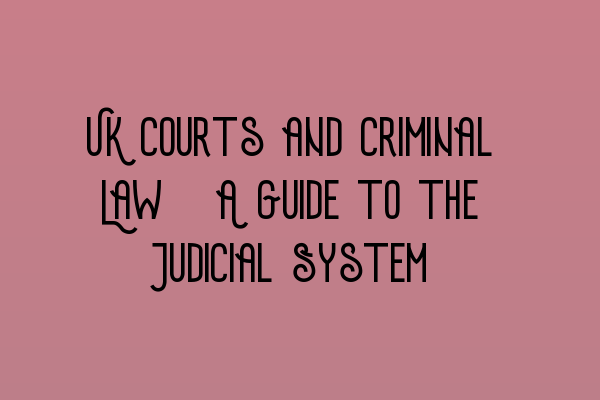UK Courts and Criminal Law: A Guide to the Judicial System
When it comes to criminal law in the United Kingdom, understanding the judicial system is crucial. The UK courts play a pivotal role in the administration of justice, ensuring that crimes are appropriately prosecuted and defendants are given a fair trial. In this comprehensive guide, we will break down the structure of the UK courts system and explore the different stages of the criminal law process.
The UK Courts System
The UK courts system is hierarchical, with different courts having varying levels of jurisdiction. At the apex of the system lies the Supreme Court, which is the final court of appeal for all civil and criminal cases in England, Wales, and Northern Ireland. Beneath the Supreme Court, we have the Court of Appeal, which hears appeals from lower courts.
Next in the hierarchy are the High Courts, which are divided into three divisions: the Queen’s Bench Division, the Chancery Division, and the Family Division. These courts primarily handle more complex and substantial cases, including serious criminal matters and civil disputes.
Below the High Courts, we have the Crown Courts, which are responsible for hearing the most serious criminal cases, such as murder, rape, and drug trafficking. Crown Courts are presided over by a judge and a jury, ensuring that the verdict is reached based on the evidence presented during the trial.
Magistrates’ Courts, on the other hand, handle less serious criminal cases, such as minor assaults and thefts. These courts are presided over by magistrates, who are volunteers and not legal professionals. Magistrates’ Courts can impose sentences, including fines and community service, but they lack the power to issue custodial sentences.
The Criminal Law Process
Now that we have a basic understanding of the UK courts system, let’s delve into the stages of the criminal law process.
1. Investigation
When a crime is reported, the police have the duty to investigate and gather evidence. This includes interviewing witnesses, collecting CCTV footage, and conducting forensic examinations. The police may also make arrests if they have reasonable grounds to believe that an individual has committed an offense.
2. Charging
If the police have gathered sufficient evidence, they may decide to charge the suspect. The decision to charge is made by the Crown Prosecution Service (CPS) in England and Wales. Once charged, the suspect will receive a written charge sheet detailing the offense they are accused of committing.
3. First Appearance
After being charged, the suspect will be brought before a Magistrates’ Court for their first appearance. At this stage, they will be informed of the charges against them, and the court will decide on bail conditions or whether to remand the suspect in custody.
4. Trial
If the case proceeds to trial, it will be heard either in the Crown Court or the Magistrates’ Court, depending on the seriousness of the offense. Trials in the Crown Court are typically more formal and involve a judge and jury. In Magistrates’ Courts, trials are presided over by magistrates alone.
5. Verdict and Sentencing
After the trial, the jury (if applicable) or the magistrate(s) will determine the defendant’s guilt or innocence. If found guilty, the court will proceed to sentencing. Sentences can range from fines and community service to imprisonment, depending on the severity of the offense.
Conclusion
Understanding the UK courts system and the criminal law process is essential for anyone involved in the legal field or facing criminal charges. By knowing the structure of the courts and the stages of the criminal law process, individuals can better navigate their way through the justice system.
For more information on related topics, check out these articles:
